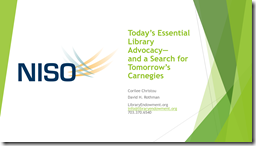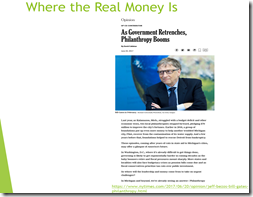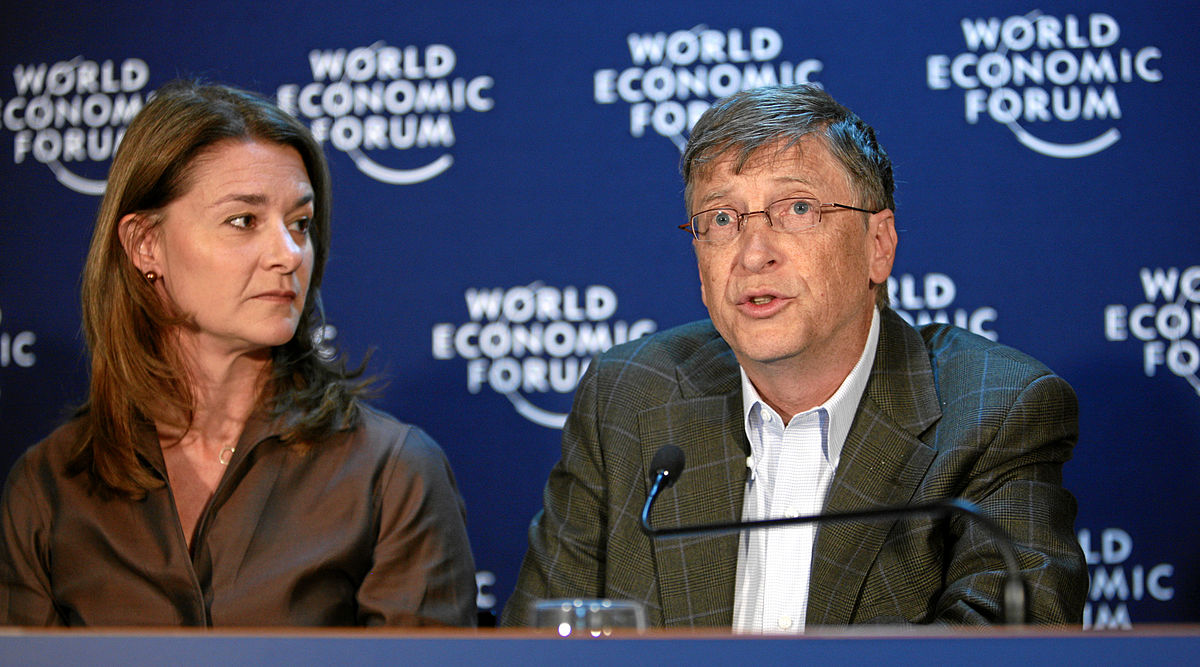2021 update: The Gates library initiative presumably has been phased out by now. Here’s a chance to start fresh. Meanwhile we learn that the Gateses are divorcing. Although they say the foundation will go on, this is yet one more argument for a multi-donor approach for a national library endowment—with different stakeholders, not just one individual or couple, making decisions.
Bill Gates once was on his way to becoming a new Carnegie for libraries, but his foundation has been winding down his Global Libraries initiative.
 How to bring Gates back and find other receptive billionaires—maybe even Jeff Bezos, the world’s richest man?
How to bring Gates back and find other receptive billionaires—maybe even Jeff Bezos, the world’s richest man?
A good strategy would be a well-structured, well-managed national library endowment with a tight focus on the needs of the poorest communities, as well as on the encouragement of innovation benefiting all kinds of libraries.
Now you can download a free PowerPoint presentation on the need for the endowment and how to make it a reality. A PDF version is here. We encourage you to share both formats with colleagues, policymakers, academics, journalists, and other influential people via email, print, or otherwise.
The authors are veteran librarian advocates. Corilee Christou is LibraryEndowment.org‘s director of library and publisher relations emeritus, a library consultant, a retired K-12, academic and special librarian, and a former Reed Business Information executive. David H. Rothman is another LibraryEndowment.org co-founder, a former poverty beat reporter, editor-publisher of TeleRead, and author of The Silicon Jungle (Ballantine) and six other books. Christou and Rothman delivered the Webinar presentation on October 10, 2018, to the National Information Standards Organization, a prestigious group for both librarians and publishers, including some majors such as Penguin Random House. Software developers also belong. Our participation in the Webinar isn’t necessarily an endorsement from NISO, but we’re endlessly thankful to the organization for its open-mindedness.
Other participants were Lance Werner of the Kent District library system in Michigan and Alan Inouye, director of policy for the Washington Office of the American Library Association.
The three presentations complemented each other. Christou and Rothman summed up the benefits of libraries and explained the need for the endowment and how it could happen through a well-planned conference at a prestigious university. Many stakeholders from various fields could attend and provide input—not just librarians, prospective donors, and content providers, but also others such as academics and well-regarded advocates for the people most in need of library services.
Lance Werner then offered solid tips on how librarians and friends could speak up for more public money. He said some of the most effective library advocacy is of the informal variety, where library supporters win over existing contacts.
Alan Inouye said ALA hoped for new federal library funding from sources far beyond the Institute of Museum and Library Services. At the same time, he reminded the Webinar of nongovernment possibilities. LibraryEndowment.org strongly supports ALA efforts.
 So why the need for the endowment, with a goal of $20 billion in assets in the first five years?
So why the need for the endowment, with a goal of $20 billion in assets in the first five years?
First, IMLS is essential but can fund just a speck of the approximately $12 billion in U.S. public libraries’ annual operating expenditures (this figure does not include those for K-12, academic, and special libraries).
Second, the proposed endowment would focus tightly on the needs of libraries without worrying about whether their missions overlapped with, say, those of NASA or the National Archives. Even the Library of Congress can do only so much. It doesn’t give out money to libraries in the most poverty-plagued towns for emergency roof repairs, for example, or hiring of qualified staffers to extend library hours. Preparation and hiring of minority librarians, providing good role models for K-12 students and other people of color, would be a special priority—and one unlikely to be a priority of the current administration in Washington or of many in Congress.
Third, being a nongovernment organization, the endowment could pick up functions of IMLS in case library-hostile politicians defunded the agency or forced it to engage in propaganda-related activities despite laws against the latter. President Trump already has sought to defund IMLS; that does not look likely now, but he may be able to cripple it in the near future through the appointment of a director less than fully enthusiastic about the agency’s mission. Trump has used similar tactics at the Environmental Protection Agency and the Consumer Financial Protection Bureau.
Fourth, the endowment could focus on appeals to rich donors. Individuals in 2017 gave $287 billion to charity. Bequests accounted for $36 billion. Foundations gave $67 billion. Only $21 billion came from corporations, where the issue so often can be dividends vs. donations. No small amount of corporate charity is self-serving. There is room for all kinds of approaches, but the real potential is in appealing to billionaires interested in good treatment in the history books—especially with just 400 Americans worth some $2.5 trillion. More than $20 trillion is expected be available for philanthropy over the next half century.
Fifth, a tax-compliant spin-off of the endowment could blend into the existing library advocacy ecosystem and fund political initiatives by ALA and other existing groups to work toward more public funding. The endowment could also help pay for stepped-up legal efforts to detail with such issues as censorship.
To access an archive of presentations like ours—not just the texts but also the accompanying audio—you can join NISO.
Meanwhile, since NISO brings together librarians and publishers, some people within both fields might be interested in research findings, from the OCLC global library cooperative, that we wish had known about before the presentation. Experts found that:
- “People who shop for books online are more likely to check out books from the library.”
- “People who browse library shelves buy more items online.”
- “People who download items from the library shop for items online more.”
If nothing else, the research might intrigue one of the world’s biggest booksellers, who, ideally, would find promise in the multi-donor endowment concept—Amazon’s Jeff Bezos. He could help out in a major way with just a fraction of his charitable spending. The related OCLC blog item, by Associate Research Scientist Chris Cyr in response to an economist’s Forbes commentary saying Amazon should replace libraries, bears the headline “Meet your guide for an Amazon journey: a librarian.”
Beyond improving the discovery of books and other items, via national digital library systems and other means, the endowment would vastly increase the amount of money librarians could spend on content. The average figure for U.S. public libraries as of the 2016 fiscal year was only $4.33 per capita on the average and just a fraction of that amount in places such as Mississippi ($1.47). Interlibrary loans can do only so much to address those issues, especially for patrons working on deadlines, including students with last-minute research needs.
In addition, the national collections could feature buying links to online and offline stores, even independent bookshops, with patrons able to prioritize the order in which the links appeared.
LibraryEndowment.org is reachable at info@libraryendowment.org or 703.370.6540.
Photo credit: By World Economic Forum from Cologny, Switzerland – Melinda French Gates, Bill Gates – World Economic Forum Annual Meeting Davos 2009. Uploaded by ComputerHotline, CC BY-SA 2.0, Link
Note: The PowerPoint and PPT files for the NISO presentation were changed on November 25, 2018, to update our pointer to a summary of a key U.K. study on the connection between recreational reading and academic achievement. The Web address we originally used no longer worked.
